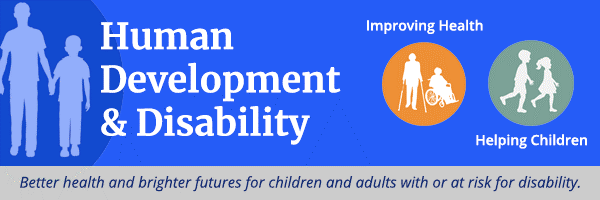DHDD Newsletter – April 2021

A Note from the DHDD Director:
Dear DHDD colleagues –
I hope you have had a productive month. This month, I had the pleasure of joining the White House virtual forum on breaking down barriers for people who have challenges accessing COVID-19 vaccination and hear about the work some of our partners are doing to close the gap and bring vaccines to the populations that so desperately need them. This event was hosted by Dr. Bechara Choucair, the National Vaccinations Coordinator for the White House COVID-19 Response Team and provided an opportunity to share best practices and lessons learned from public health efforts to improve COVID-19 vaccine access for people with disabilities and people who are unable to leave their home. I know many of you were able to join the seminar and hope you felt as inspired as I do to continue to help ensure that people of all abilities have access to COVID-19 vaccines.
Thank you for all you do.
Stay healthy!
Blythe
In the Spotlight
April is Autism Acceptance Month
In recognition of Autism Acceptance Month, DHDD wants to highlight a few recent publications that help further the discussion on some of the pressing issues affecting the autistic community.
Transitioning from Pediatric to Adult Health Care is Often Difficult for Adolescents with Autism Spectrum Disorder (ASD)

A recent MMWR looking at health status and health care use among adolescents identified with and without ASD in early childhood found that, in general, few adolescents receive the recommended guidance for transitioning from pediatric to adult health care. However, this can be particularly difficult for adolescents identified with ASD in early childhood who, compared to other adolescents, are more likely to have additional mental or physical health conditions that require more services and coordination among healthcare providers, but are also less likely to receive the healthcare services they need.
Greater coordination among healthcare programs and interdisciplinary training for providers could expand access to services and increase provider comfort in treating the unique healthcare needs of adolescents with ASD, and support healthcare planning as they transition from pediatric to adult health care.
ASD, Digestive Issues and Pica

Gastrointestinal symptoms such as vomiting, diarrhea, constipation, or abdominal pain can occur more often among preschool children with ASD. Some of these symptoms may be related to pica, a condition in which a person repeatedly eats things not considered food such as dirt, paint chips, and clay. Pica can lead to serious medical and surgical problems, including gastrointestinal parasites, lead toxicity, nutritional deficiencies, choking, poisoning, intestinal obstruction, perforation resulting in surgery, and even a blood infection, which can be life-threatening.
Read a feature about this topic and the recent publication Pica, Autism, and Other Disabilities.
Comparison of Two Case Definitions for Ascertaining Prevalence of Autism Spectrum Disorder among 8-Year-Old Children

A new publication compares new and previous case definitions for identifying Autism Spectrum Disorder (ASD) in children. The new case definition utilizes ASD diagnoses and classifications made by qualified community professionals. This case definition does not require clinical review and involves less data collection, resulting in more timely reporting. The new case definition also more directly measures community identification of ASD, thus allowing for more valid comparisons among communities, and reduces resource requirements while retaining similar measurement properties to the previous definition.
CDC COVID-19 Upcoming Partner Events & Updates
Webinar – Assessing and Addressing Priorities and Inequities in Developmental Monitoring and Early Identification: Strategies from the Act Early COVID-19 Response Efforts
Please join the Association of Maternal & Child Health Program and its partners at the American Academy of Pediatrics, Association of University Centers on Disabilities, and Title V, family and community leaders from the Act Early COVID-19 Response teams on May 13, 2021 11:00 AM ET for a webinar to:
- Understand current gaps and strengths in early childhood systems to address early identification of children’s developmental needs
- Identify systems and program priorities that advance equitable and optimal children’s health and development outcomes.
- Describe how Learn the Signs. Act Early. resources and strategies can be used to address priorities in promoting children’s health and development, and early identification of needs.
CDC COVID-19 ASL Videos Now Available Online
New and updated CDC COVID-19 American Sign Language (ASL) videos have posted to CDC’s #COVID-19 ASL playlist. Video topics include extra precautions for people with disabilities, vaccine information, planning safer outings and visits, back to school planning for parents and caregivers, living in shared housing, precautions for extended families living in the same home, information for people with disabilities and their care providers, and are COVID-19 vaccines safe.
Videos to Help Protect Yourself From COVID-19
Adults with intellectual and developmental disabilities are the primary audience for these videos, but many other individuals, with and without disabilities, may benefit.
Easy to Read COVID-19 Materials
Easy to Read COVID-19 materials were primarily developed for people with intellectual and developmental disabilities and others who read or listen with understanding below a third-grade level. Recently published materials include
COVID-19 Vaccines for Caregivers and Personal Care Assistants (PCA)

Join Georgia Tech’s Center for Inclusive Design and Innovation for their first vaccine webinar on the considerations of COVID-19 vaccines for caregivers and PCAs within the disability community.
Wednesday, May 12, 2021
3:00PM to 4:00PM ET
Registration Link
The resources above were created in partnership with the Center for Inclusive Design and Innovation at Georgia Tech, and supported by a grant from the CDC Foundation. More information about this project and additional accessible COVID-19 resources including “Easy to Read” materials and braille can be found on the microsite hosted by Georgia Tech.
New Resources
CDC’s New Healthy Equity in Action Web Page

CDC is launching a new web page, Health Equity in Action, for visitors to learn more about CDC’s collaborative efforts to address health disparities among populations at higher risk for COVID-19. CDC and its partners are committed to reducing the disproportionate burden of COVID-19 among populations at increased risk for infection, severe illness, and death.
Health Equity in Action highlights some of the multiple CDC efforts in place related to COVID-19 from across CDC’s COVID-19 response and partnerships. These projects align with CDC’s COVID-19 Health Equity Strategy and offer web page visitors examples of CDC efforts to improve the health outcomes of populations disproportionately affected by COVID-19.
Now Open for Applications for CDC Funding Opportunity: Improving the Health of People with Mobility Limitations and Intellectual/Developmental Disabilities through State-based Public Health Programs (CDC-RFA-DD21-2103)
The National Center on Birth Defects and Developmental Disabilities, Division of Human Development and Disability, announces the publication of the Notice of Funding Opportunity (NOFO) CDC-RFA-DD21-2103: Improving the Health of People with Mobility Limitations and Intellectual/Developmental Disabilities through State-based Public Health Programs. This NOFO supports a new five-year, non-research cooperative agreement to address statewide or jurisdictional needs related to reducing health disparities among adults with intellectual and developmental disabilities (IDD), and adults with mobility limitations (ML) in the United States. More information can be found at www.grants.gov.
Applications are due into Grants.gov by May 11th , 2021 at 11:59 p.m. U.S. Eastern Standard Time
“Prepared4ALL: Whole Community Inclusive Emergency Planning”
“Prepared4ALL: Whole Community Inclusive Emergency Planning” is now LIVE! Click here to Take the training! Select the Prepared4ALL Course “For Myself” option. You will then be directed to a “checkout” page, which will ask for your “billing details” – this training is free! This information will only be used to create a user account and password. Once you fill in your information you can then access the course on your account dashboard.
The Prepared4ALL: Whole Community Inclusive Emergency Planning course is a free online, scenario-based role-play simulation, where the learner takes on the role of “Terrye Trainee,” who visits “Disasterville, USA” to learn about whole community emergency planning. Terrye (the learner) is “coached” by Disasterville’s emergency manager, public health preparedness planner, and Americans with Disabilities Act (ADA) coordinator. Terrye “meets” Disasterville’s Prepared4ALL Action Team, and community members, and answers questions, makes decisions, and reflects on the learning.
Publications
Poor mental health in fathers is related to poor mental and physical health in children

A new study was published in the journal Adversity and Resilience Science: Journal of Research and Practice with a specific focus on fathers’ mental health, for a special issue on fatherhood. Researchers asked parents or other caregivers to report on their child’s general and mental health and on the mental health of the child’s primary caregivers (male and female).
Compared to children whose fathers (including other male caregivers) had good mental health, children whose fathers had poor mental health were about 5 times as likely to have poor general health and about 2 times as likely to have a mental, behavioral, or developmental disorder, similar to associations seen for mothers and other female caregivers.
Overall, 1 in 14 children aged 0–17 years had a parent who reported poor mental health. Those children were more likely to have poor general health, to have a mental, behavioral, or developmental disorder, to have adverse childhood experiences such as exposure to violence or family disruptions including divorce, and to be living in poverty.



